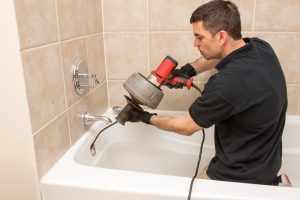
Do you have your drains routinely cleaned? If not, you should be! Our plumbers will come to your home and use the best in currently technology, such as hydro-jetting technology, to comprehensively clean out the drainpipes throughout your home. This removes the buildup that leads to frequent slow drains and clogs, and also helps prevent pipes from suffering other damage as well.
“But wait,” you might be wondering, “can’t I just use liquid drain cleaner I bought at the store to treat clogs?”
You can, but this would only provide a temporary solution to the problem, and these drain cleaning chemicals are so caustic that they could be harmful to you and are definitely—perhaps even ironically—harmful to your pipes. The corrosive chemicals cause corrosion, leading to premature pipe replacement. The best thing to do is invest in routine drain cleaning, and also to know how to prevent clogs from forming to begin with, which we’ve delved into below.
How Do Clogs Start?
There are a number of reasons clogs start building up in drainpipes. Some are due to simple accidents, like the lid of a bottle falling into a sink drain or the like. Drainpipes that were poorly installed can also clog up regularly.
The most common reason for drain clogs, though, is due to buildup within the drainpipes over time—here are some of the most common types of buildup:
Hair
Hair is a big issue for bathroom drains, such as your shower drain or sink drains. It catches easily in the curved pipe section right below the drain—known as the p-trap. Once it does this it starts to catch other hair follicles.
Eventually, a tangle clog will close off water flow, and it can be tough enough to even resist plungers. Regular drain cleaning from a pro will help with this, but another way to prevent this is by purchasing drain covers designed specifically for this purpose.
Soap Scum
The residue from soap—something that you have most likely encountered more than once—sticks to surfaces and is very often hard to scrub away. Think of all of this soap residue forming within your drainpipes!
Not only does soap scum increase the chance of slow drains and clogs, but it can inflict damage to the pipe walls due to chemical reactions.
FOG and Other Organic Waste
Your kitchen sink drain is at the highest risk of clogging due to food waste that goes down. Any organic waste can start building up inside the drain (yes, despite having a garbage disposal), with the worst enemy of kitchen sinks being FOG—that is, fats, oils, and grease.
FOG is liquid when hot, but it cools down inside the drains and changes into an obstinate and waxy solid. After the holidays (right about now!) is a great time to have your kitchen sink drains hydro-jetted to remove buildup before it forms a clog.
Hard Water Minerals
Hard water is a widespread problem. It describes water with a high level of certain minerals in it—namely calcium, magnesium, and iron. These minerals are harmless to ingest, however, over time they leave a limescale buildup along the inside of your pipes. This reduces water volume to levels where leaks and clogs can start occurring.
Limescale needs to be cleaned out, and the hard water problem needs to be addressed, with a whole-house water softener installation.
For expert service on your plumbing in Sandy Springs, GA, look no further than DC Cheek Heating, Cooling & Plumbing. Contact us today!



